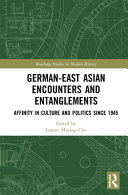
German-East Asian Encounters and Entanglements PDF
328 Pages·2020·4.1382 MB·other
Most books are stored in the elastic cloud where traffic is expensive. For this reason, we have a limit on daily download.
Preview German-East Asian Encounters and Entanglements
Description:
"This volume surveys transnational encounters and entanglements between Germany and East Asia since 1945, a period that has witnessed unprecedented global connections between the two regions. It examines their socio-political and cultural connections through a variety of media. Since 1945, cultural flow between Germany and East Asia has increasingly become bi-directional, spurred by East Asian economies' unprecedented growth. In exploring their dynamic and evolving relations, this volume emphasizes how they have negotiated their differences and have frequently cooperated towards common goals in meeting the challenges of the contemporary world. Given their long-standing historical differences, their post-1945 relations reveal a surprisingly high degree of affinity in many areas. To show how they have deeply shaped each other's views, this volume presents twelve chapters by scholars from the fields of history, sinology, sociology, literature, music, and film. Topics include cultural topics, such as German and Swiss writers on East Asia (Enzensberg, Muschg, and Kreitz), Japanese writers on Germany (Tezuka and Tawada), German commemorative culture in Korea, Beethoven in China, metal music in Germany and Japan, diary films on Japan (Wenders), as well as socio-political topics, such as Sino-East German diplomacy, Germans and Korean democracy, and Japanese and Korean communities in Germany"--
See more
The list of books you might like
Most books are stored in the elastic cloud where traffic is expensive. For this reason, we have a limit on daily download.
